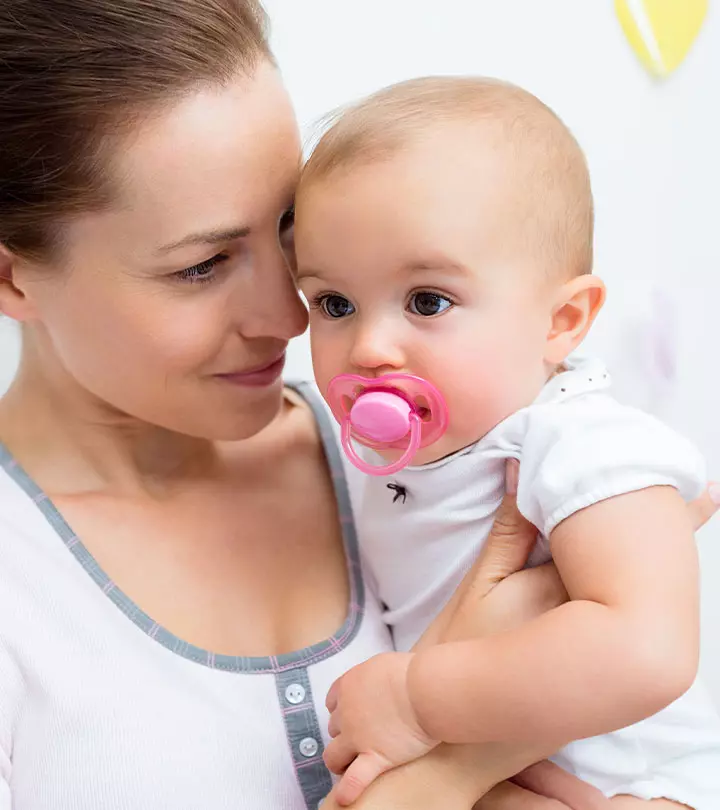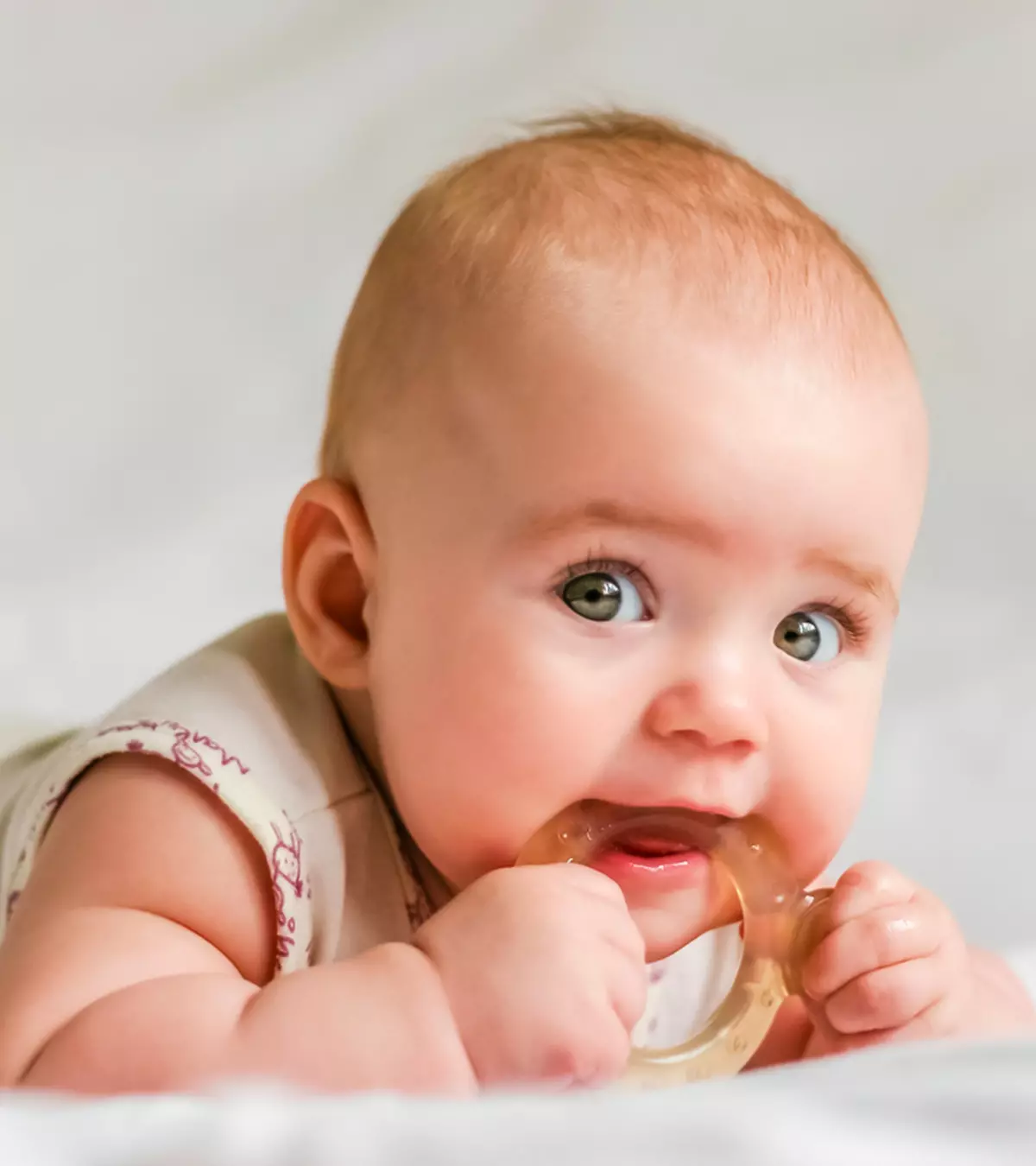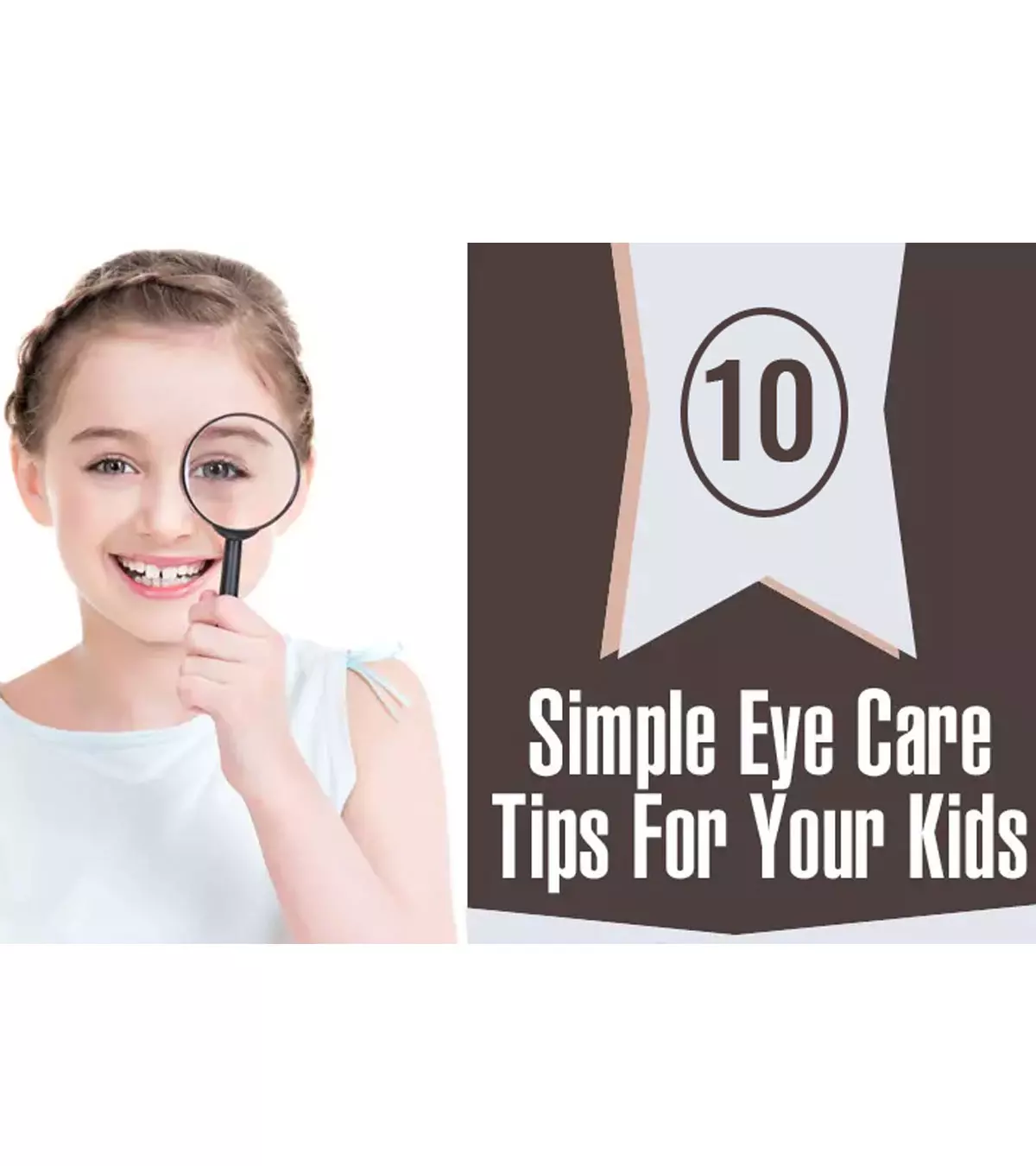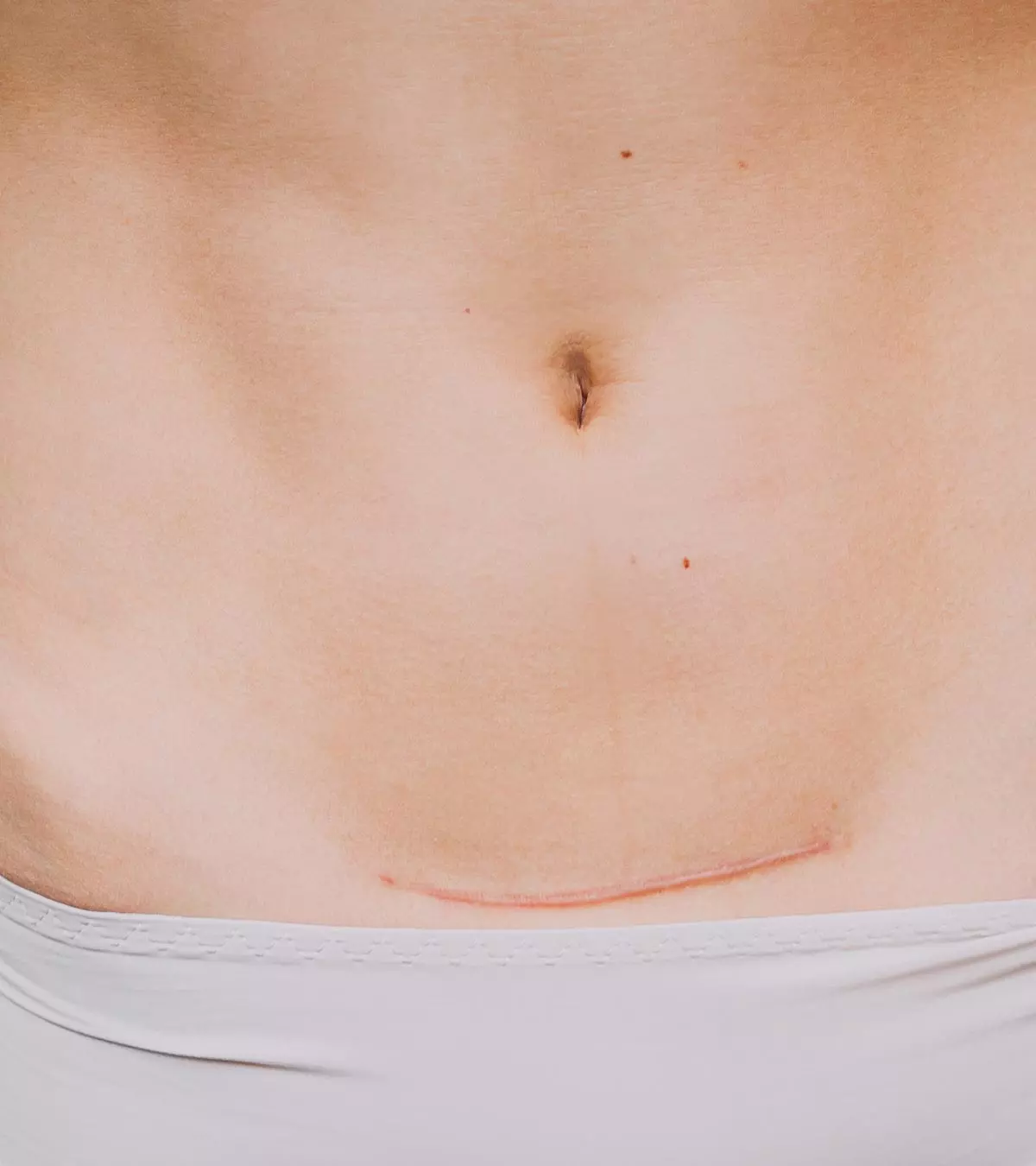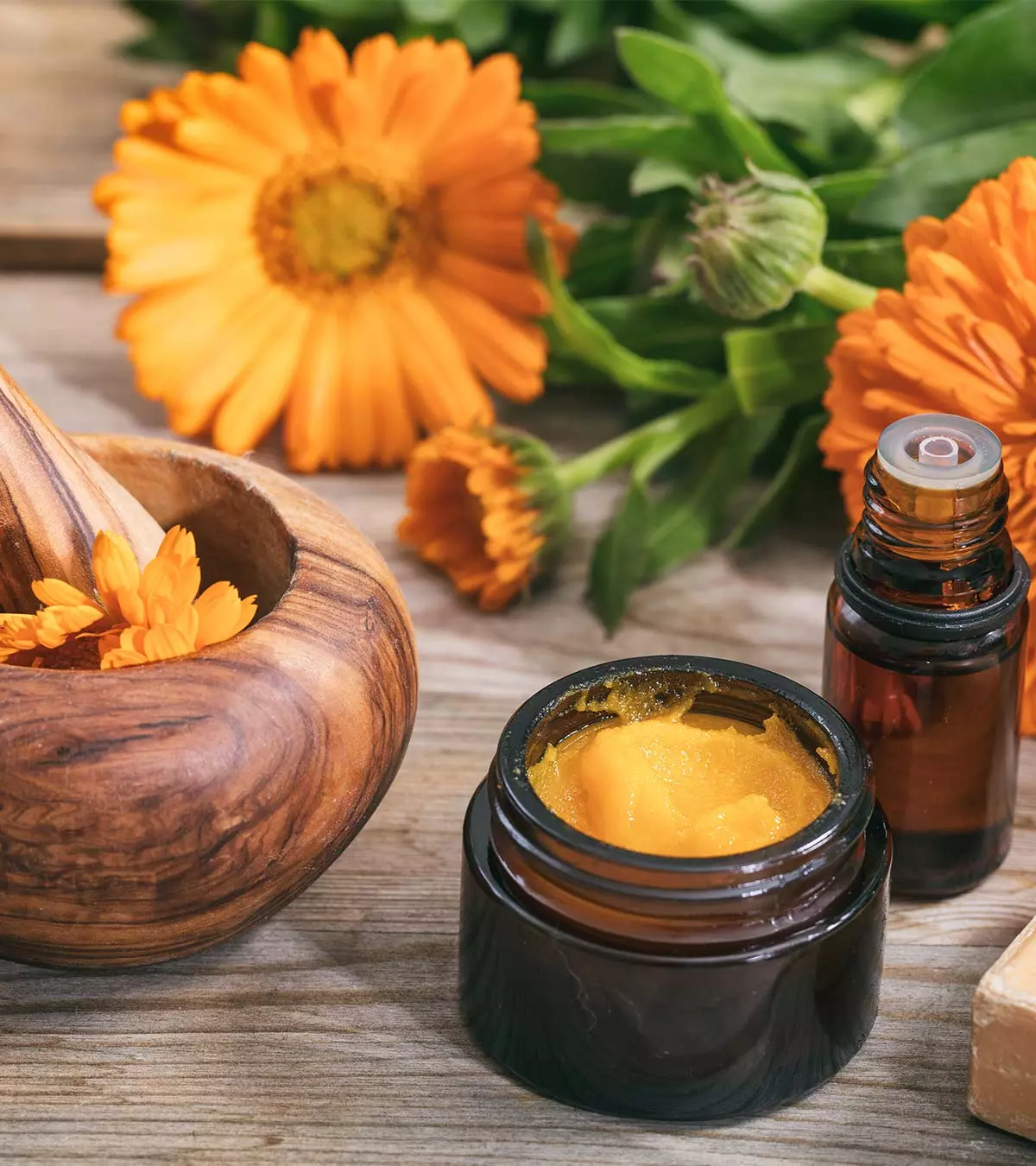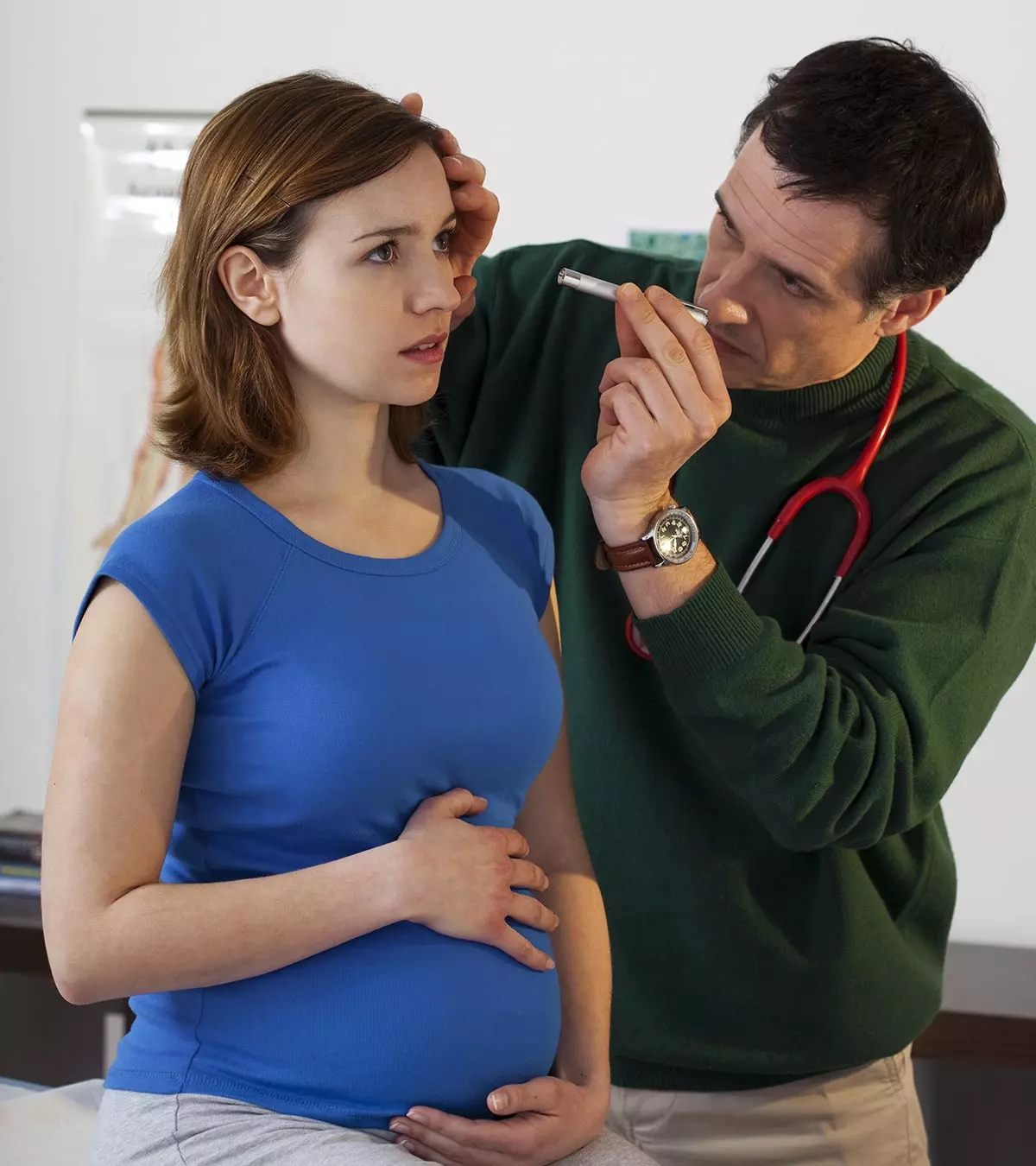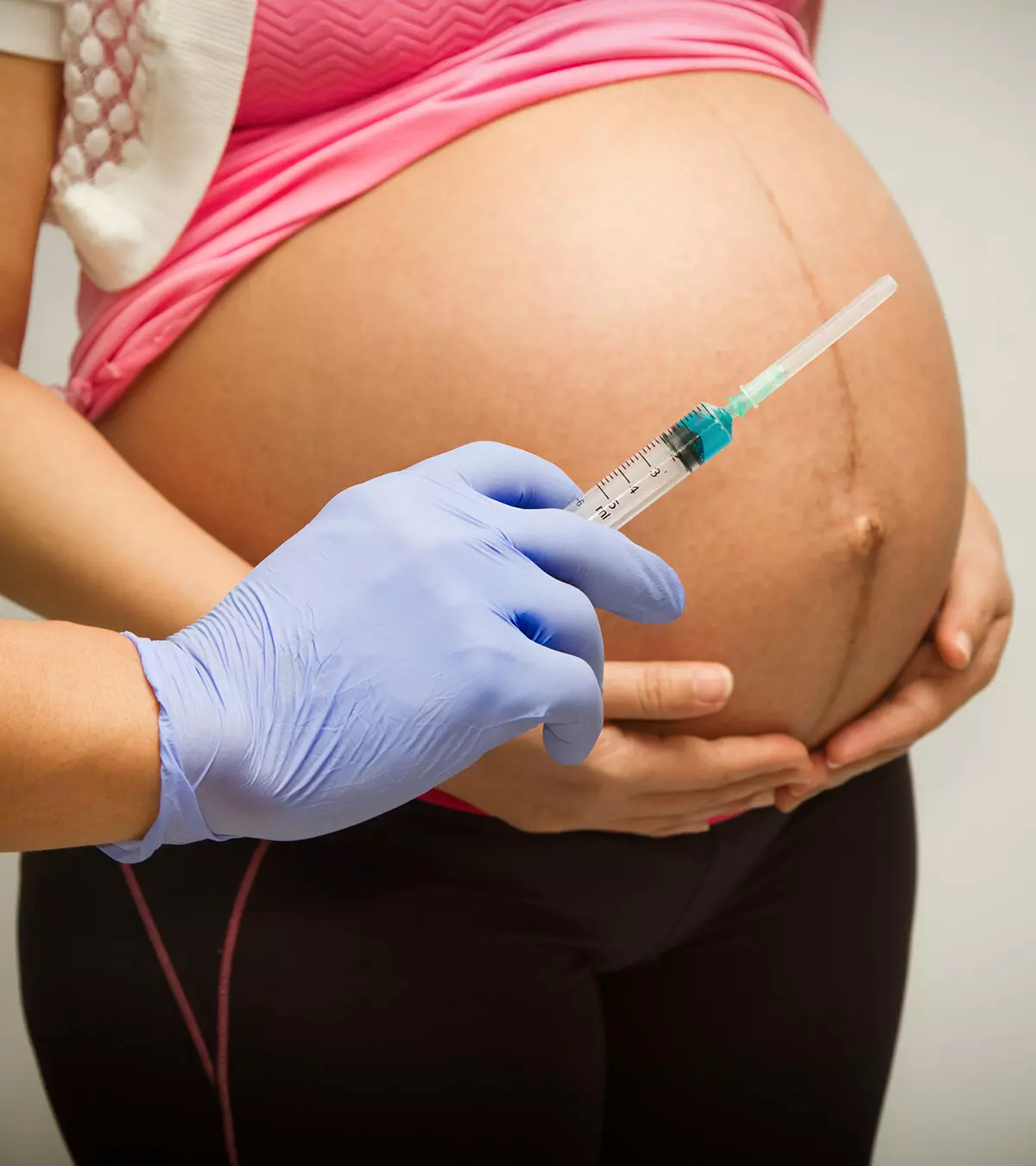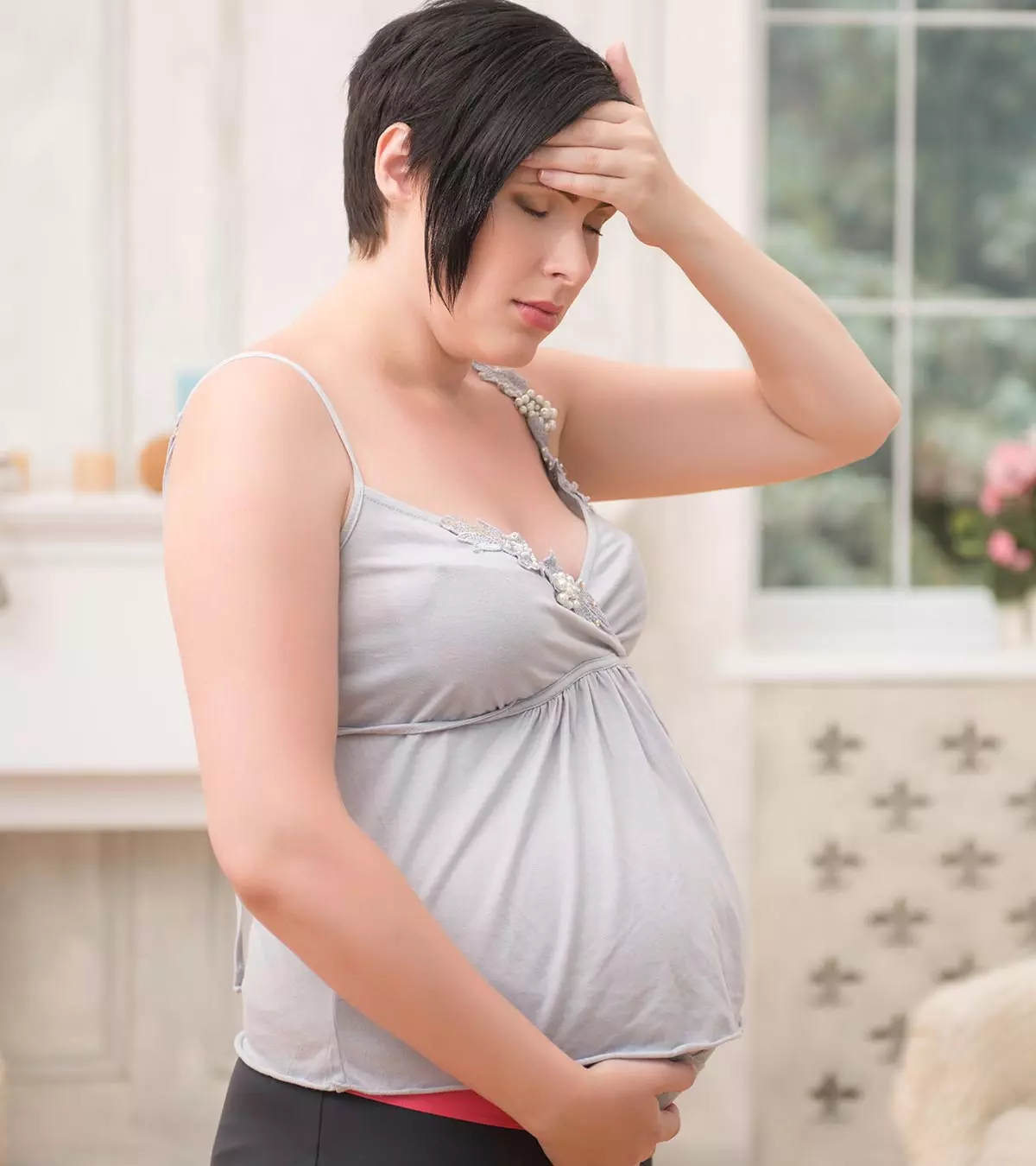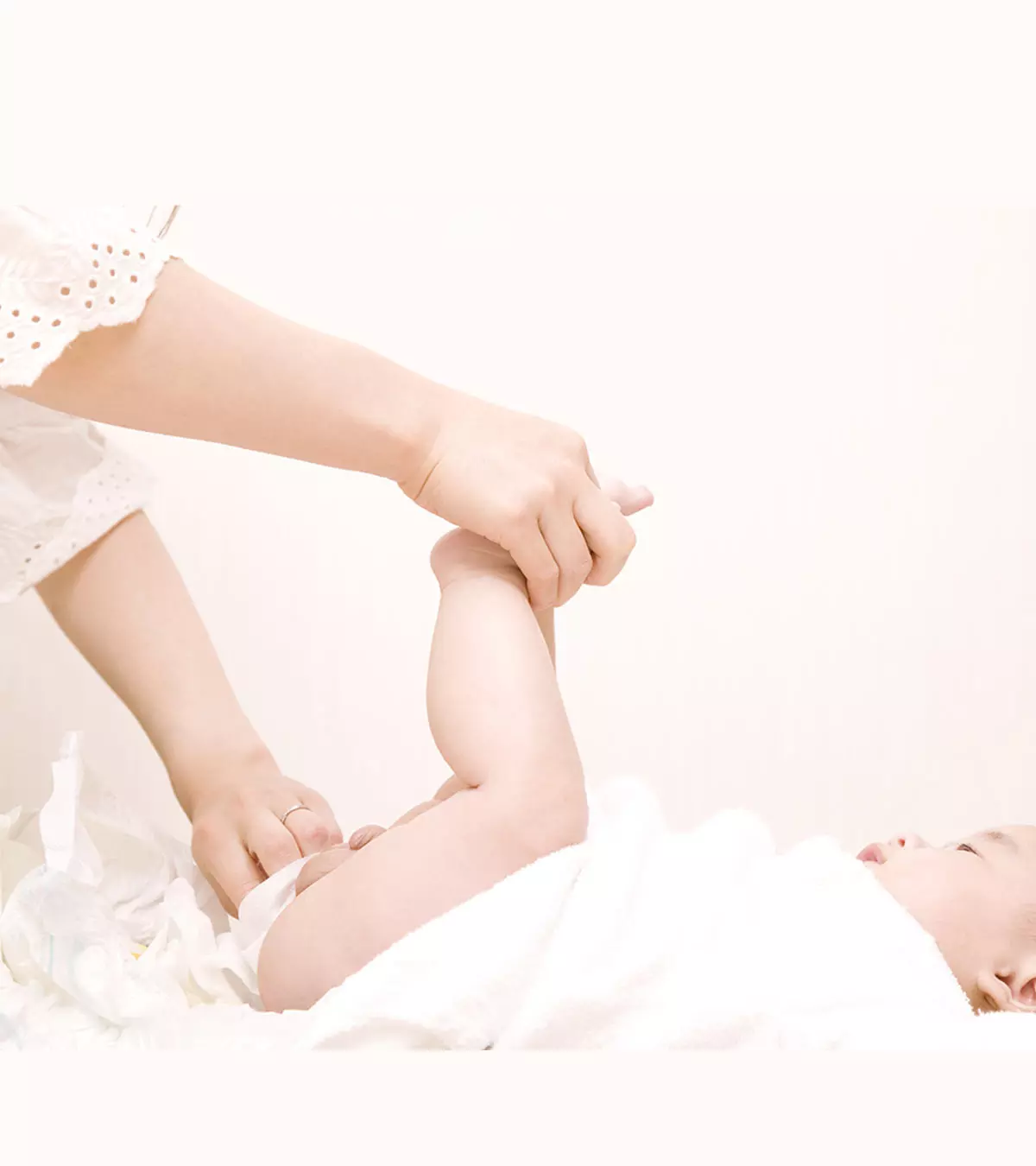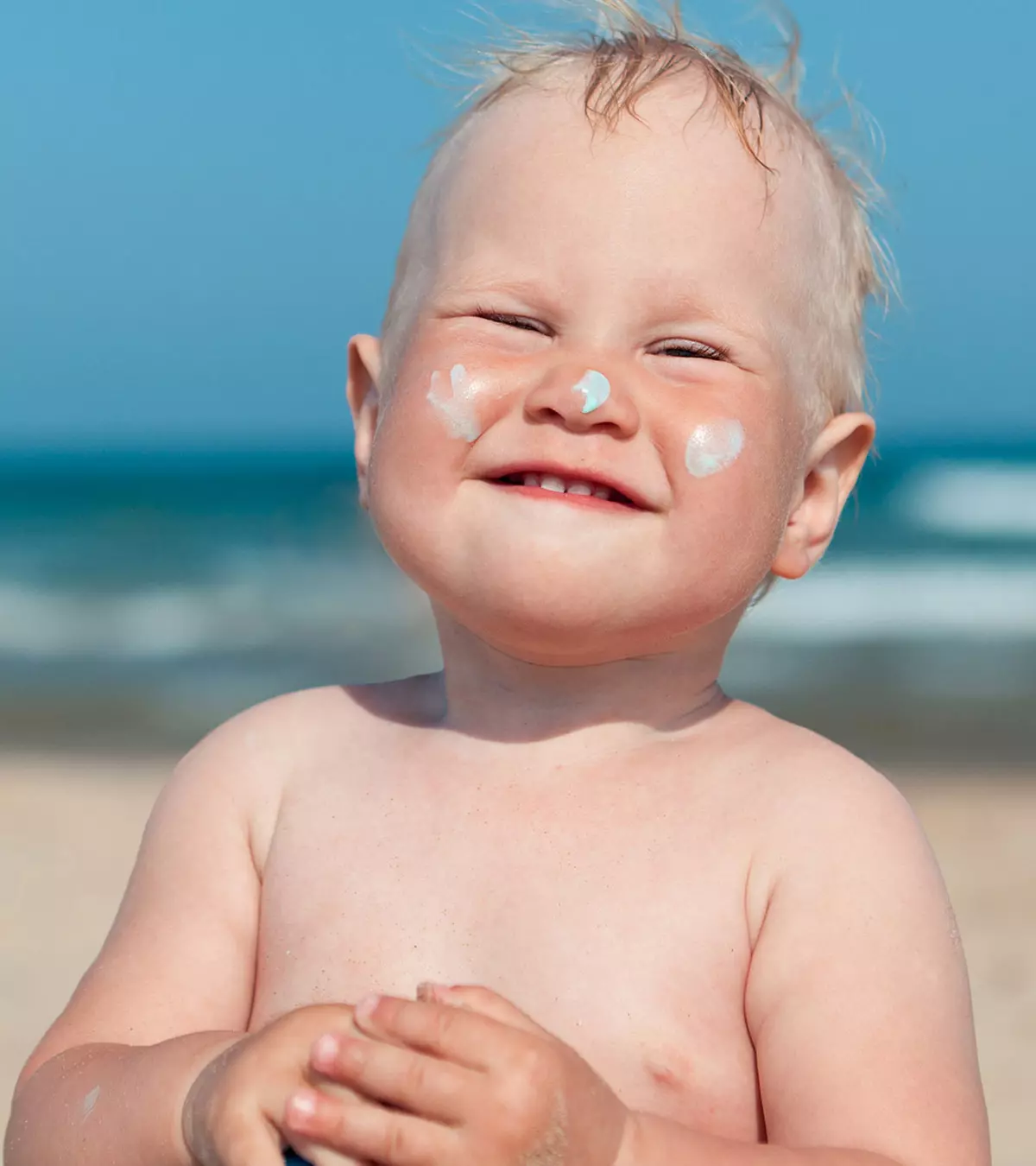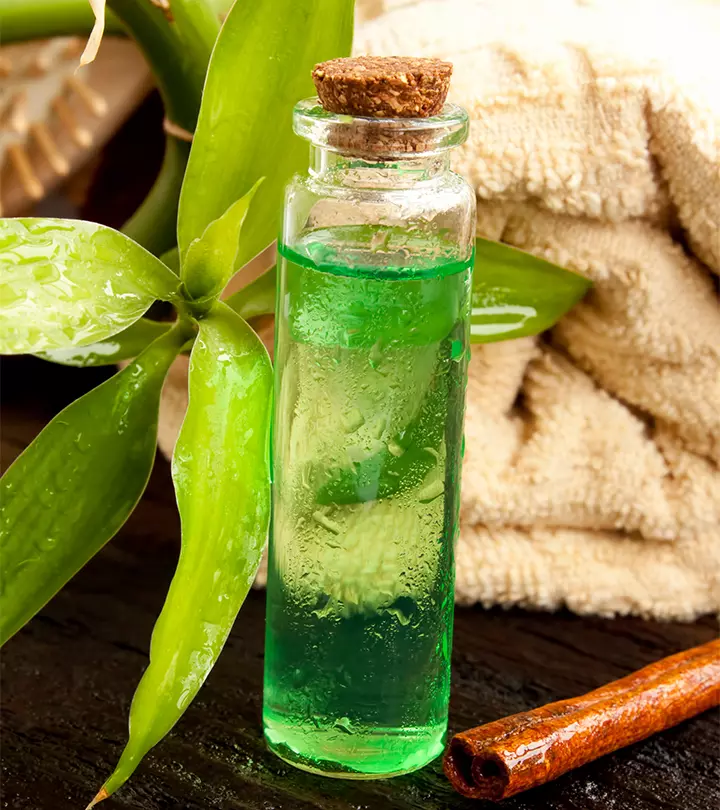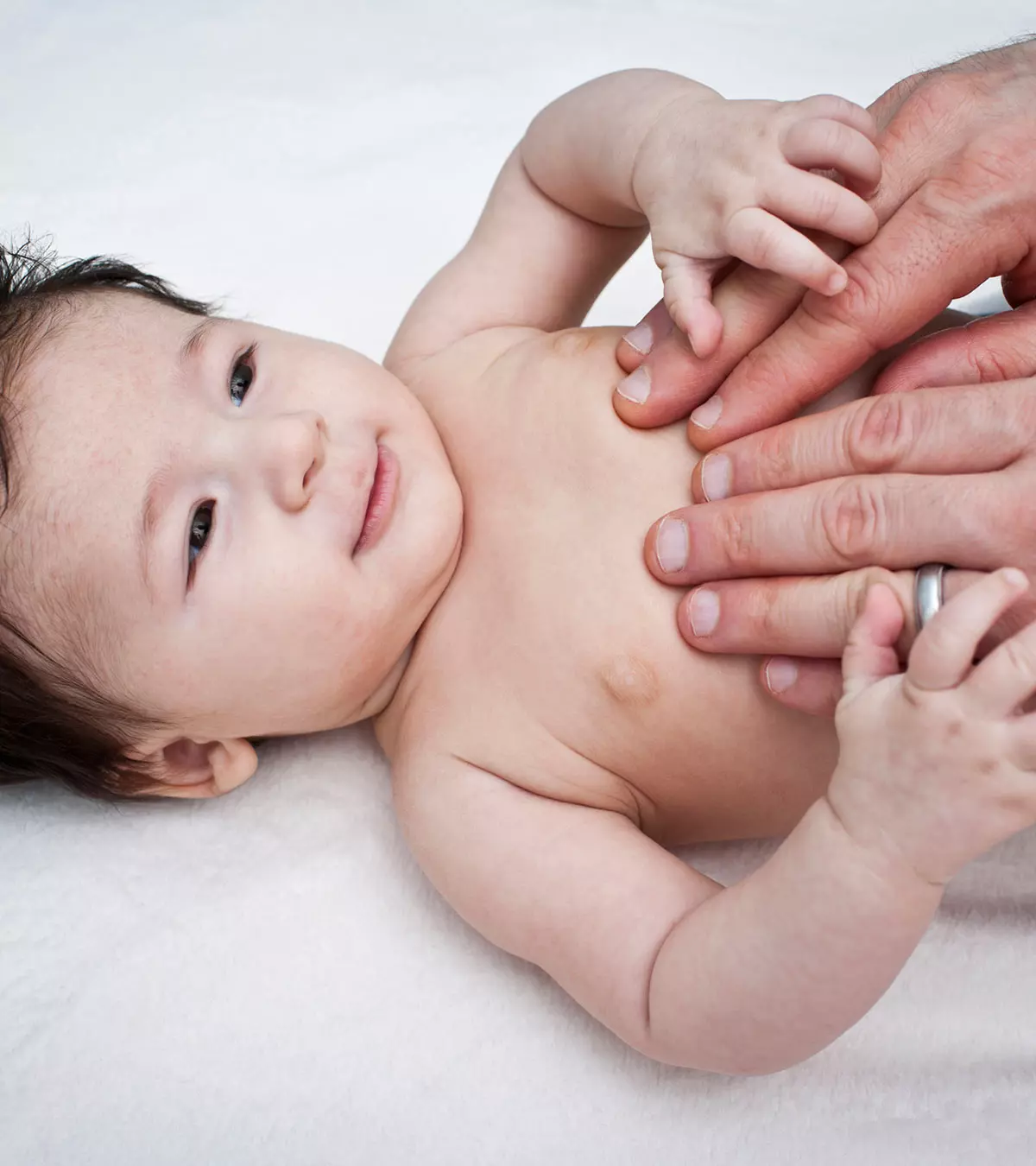
Image: ShutterStock

Many parents may consider trying Vicks Vaporub for babies when they develop a common cold. The American Academy of Pediatrics states that infants may have eight to ten bouts of the common cold during the first two years (1).
Vicks VapoRub is a product popular among parents since it is a topicaliApplied on the surface of the body medication, and other oral over-the-counter medicines are not recommended for babies. But is Vicks safe for babies?
Read this post to know the safety, effectiveness, correct use, and alternatives to Vicks VapoRub for babies.
This post is for informational purposes only and not a promotional piece for the manufacturer. We suggest you talk to a pediatrician before using any OTC medicines for your baby.
Key Pointers
- Vicks VapoRub should not be used on babies younger than two years, but Vicks BabyRub is meant for babies three months and older.
- Vicks BabyRub gently calms and relaxes your baby when they have common cold.
- Use it while keeping some safety tips in mind, such as not to heat or microwave it and not to use it if it is expired.
Is Vicks VapoRub Safe For A Baby?
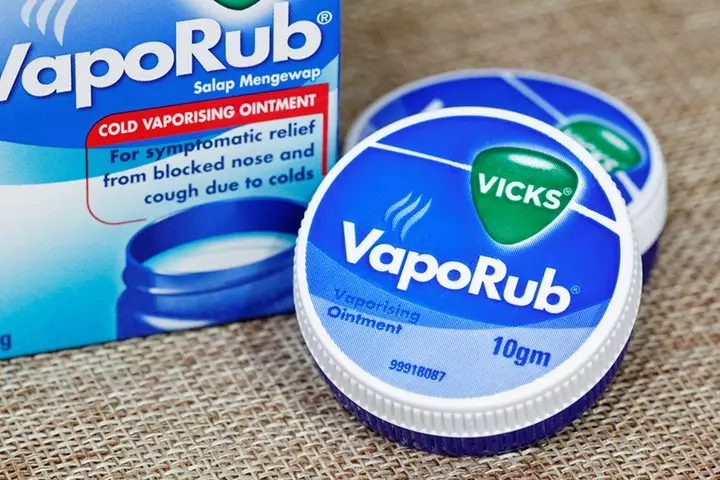
Image: Shutterstock
Can you put Vicks on a baby? This is a common question that many mothers may have when seeing their little one with a common cold. Vicks VapoRub should not be used on babies younger than two years (2). Vicks BabyRub is an option manufactured by the same brand for babies three months and older (3).
Why Should You Not Use Vicks VapoRub For Babies?
Let us find out why Vicks may not be a suitable treatment option for your little one. Anna H. Chacon, MD, a board-certified dermatologist from Miami, Florida, says, “Vicks VapoRub has been linked to skin lightening beneath the nose in certain situations. Long-term or excessive usage of Vicks VapoRub has also been linked to an uncommon type of pneumonia in rare situations.”
Vicks VapoRub can irritate the baby’s airways and cause excessive mucus production leading to nasal congestion (4). Therefore, you must avoid its use in babies younger than two years.
Vicks VapoRub is a mentholatediContaining menthol topical ointment, intended for use over the chest, back, and throat for subduing cough, and muscle and joint pain. The oil-based medication can be inhaled without hot steam. Major ingredients in Vicks VapoRub are (5):
- Camphor acts as a cough suppressantiMedicine to quieten coughs and painkiller.
- Eucalyptus oil is a cough suppressant.
- Menthol is a cough suppressant and analgesiciMedicine used to relieve pain .
- Turpentine oil reduces chest congestion.
- Cedarwood oil is antiseptic, antispasmodiciMedicine used to treat symptoms arising out of the gut, such as stomach cramps , and antifungal.
- Nutmeg increases immunity while reducing pain and insomnia.
- Thymol is antioxidant, anti-inflammatory, and antiseptic.
 Expert says
Expert saysUse Of Vicks BabyRub For Babies
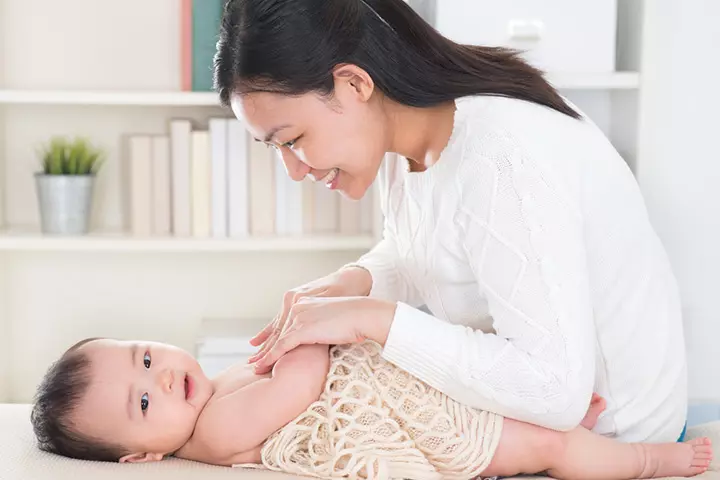
Image: Shutterstock
Can you use Vicks on a baby? Let’s find out in this section.
Vicks BabyRub gently moisturizes, soothes, and relaxes your baby. A gentle massage on the baby’s chest, neck, back, and soles of feet can make your baby feel comfortable.
A mother and blogger shares her story about trying several remedies to help alleviate her son’s stuffy nose on her blog site named Canuck Mommy. She explains, “Now that Hayden is a full-fledged toddler and I cannot get anywhere near him with a nasal aspirator, I have turned to using Vicks Baby on his feet and putting socks over the top before bed. It works like a dream! (i)”
The ointment is safe for babies because it is camphor-free. Vicks BabyRub contains aloe vera, coconut oil, soft white paraffin, and fragrances of lavender and rosemary.
Vicks BabyRub Myths Vs. Reality
- It is not safe for babies.
Vicks BabyRub is specially formulated for babies above three months of age. The manufacturer claims it to be made from natural and non-medicated ingredients.
- It can be harsh for a baby’s sensitive skin
Vicks BabyRub is claimed to be developed by skin experts, and the formulation is mild and natural. It helps relax and soothe your baby.
- Vicks BabyRub is a lotion
It is not a lotion but a rub (liniment or ointment). Therefore, a small quantity is needed for application on your baby’s body.
How To Use Vicks BabyRub?
The manufacturer recommends the following directions for the use of Vicks BabyRub.
- Gently massage Vicks BabyRub over the baby’s chest, back, neck, and soles of feet.
- Cover the body with warm and dry clothes.
- Keep the clothing loose near the throat and chest to help vapors reach the nose.
- Repeat the application if required, but not more than three times a day.
- Cover your baby’s feet with socks to prevent the ingestion of ointment.

Image: IStock
Does Vicks VapoRub/BabyRub Really Work For Babies?
Vicks VapoRub/ BabyRub is not a decongestant and it does not cure cold or cough in babies. Instead, it may help calm, soothe, and relax a baby with a common cold.
Amanda Sztar, a mom of two kids and a pharmacist, shares on her blog Pharmamum how Baby Vicks eucalyptus rub helps calm her children and aids in better sleep. She says, “I honestly don’t know how it works, but whenever I rub it (Baby Vicks eucalyptus rub) on my children’s feet, they often have a better night’s sleep with a lot less coughing (ii).”
Vicks VapoRub is labeled as a topical cough suppressant and topical analgesic (2). Menthol and camphor vapors create a cooling effect in the nasal passage, making it easier for the child to breathe and sleep. Vicks has been recommended for the common cold. However, Vicks VapoRub is not recommended for cough with high phlegm, chronic cough, asthma, and emphysemaiWhen walls between air sacs in the lungs are damaged, making it harder for the lungs to move oxygen in and carbon dioxide out .
Precautions To Take While Using Vicks VapoRub And BabyRub
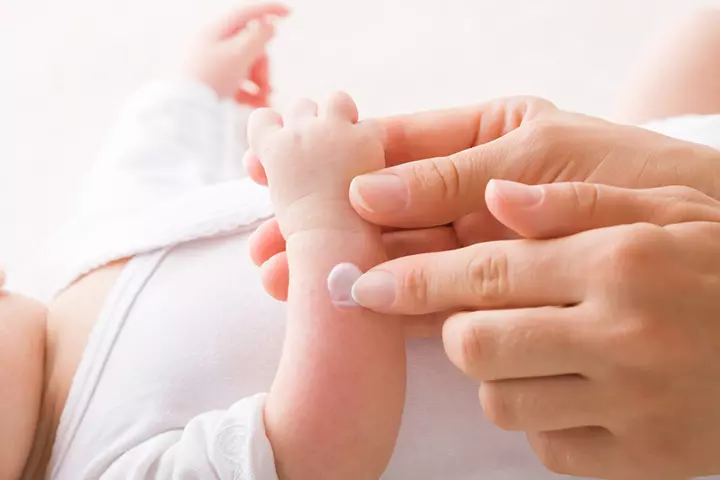
Image: Shutterstock
- Vicks Rubs (VapoRub and BabyRub) should not be used beyond the expiry date on the package.
- Rubs should not be heated, microwaved, or added to boiling water. Doing so may cause the ointment to splatter and cause burns.
- It should not be applied on skin with open wounds.
- Vicks Rubs are for external use only. The contents of the rubs could be toxic to babies if ingested.
- Check if your child’s skin is allergic to the product by applying a small amount on the skin of the hand.
- Do not apply Vicks Rubs on the nose, nostrils, forehead, and eyes, because it can cause respiratory distress and eye irritation.
- Do not apply Vicks anywhere near your baby’s eyes.
- Avoid using Vicks Rubs with other essential oils or emollients.
 Caution
CautionAlternatives To Vicks VapoRub/BabyRub For Babies
Dr. Chacon recommends, “You might try a non-medicated massage designed for babies 3 months and older. The product is marketed as a “soothing ointment” with eucalyptus, rosemary, and lavender smells.”
1. Vaporizers and humidifiers
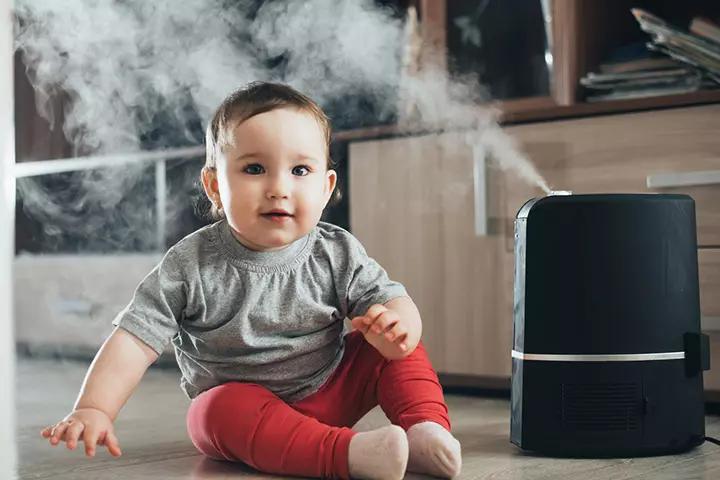
Image: IStock
Humidifiers work by creating mist from cold water, while vaporizers heat water to create steam. Cool-mist humidifiers are safer than warm-steam vaporizers for the baby’s use, as it will nullify the chances of burns if they get too close to the device. A few vaporizers allow you to vaporize medications or compounds for inhalation.
Advantages of vaporizers and humidifiers are that they:
- Add moisture to indoor airs
- Prevent dry skin problems.
- Relieve cold, flu, and allergy symptoms.
- Help soothe nose irritation, dry throat, and headache.
- Soothe our sinuses and nasal passage by keeping them moist.
You can consider the following vaporizer and humidifier products from Vicks.
- Vicks vaporizers are devices used to vaporize medications for inhalation. It boils the water and releases vapor in the room to moisten dry air and soothe the irritated sinuses. It also helps reduce throat and bronchial irritation associated with cough and cold. You may use Vicks products, such as VapoPads and VapoSteam, that add medicated fragrant steam to the air for easy breathing and a soothing effect.
- Vicks humidifier releases cool-mist to maintain the necessary moisture level in the air. It can help provide relief from symptoms of cough and congestion. A cool-mist humidifier is a bit noisy compared to ultrasonic humidifiers, which are silent. If you have hard water supply in your area, then use a demineralization cartridge with Vicks humidifier or filtered water. Do not add essential oils in the tank of the humidifier as oil can damage it. You can use Vicks Vapopads with some models of Vicks cool-mist humidifiers.
Vicks VapoPads are small pads that can be inserted into dedicated slots in humidifiers and vaporizers. The pads add mentholated fragrance to the air for relief from cough and cold symptoms. Vicks VapoSteam achieves the same effect in a liquid form.
2. Saline nasal drops
Saline nasal drops are a popular remedy to clear a baby’s blocked nasal passages. Put some drops of saline solution into the baby’s nose and use a bulb syringe to suction out the mucus. Your baby’s pediatrician can suggest appropriate saline drops for a baby to relieve cold and cough symptoms.
 Quick tip
Quick tip3. DIY natural vapor rub for your baby
You can make your very own natural vapor rub at home with the following steps.
- Melt two tablespoons of beeswax.
- Add four drops of eucalyptus oil and one tablespoon of coconut oil.
- Stir this mixture to form a uniform mix.
- Store this in an air-tight container in a dark place.
Use the rub as an when needed. This home-made rub for your baby is preservative- and chemical-free.
Other Uses Of Vicks VapoRub
Vicks Vaporub can be used for the following purposes.
- Mosquito repellent: The camphor oil and menthol in Vicks VapoRub may repel mosquitoes.
- Treating toenail fungal infection: The cedarwood oil and thymol in Vicks VapoRub have antifungal properties, which may help treat fungal infections.
Frequently Asked Questions
1. Is putting Vicks VapoRub on a baby’s feet safe?
Vicks VapoRub should not be applied to any part of the baby’s body. You may apply VapoRub on the feet of children older than two years. Vicks BabyRub is safe to apply on the feet of babies older than three months. Putting BabyRub on your baby’s feet and then covering the feet with warm socks or warm towels can help suppress the symptoms of cough and cold. Massaging the baby’s feet can help them relax further.
2. When should I use a vaporizer for my baby?
You can use humidifiers and vaporizers whenever you intend to relieve the baby’s cold symptoms. You may use a cool-mist humidifier to relieve symptoms of cold and cough. If you intend to use warm-mist vaporizers, place them away from the baby’s reach. Some devices work with mentholated pads and solutions. These devices can be non-topical alternatives to subside cold symptoms.
3. Is Vicks VapoRub toxic?
Vicks VapoRub contains camphor, which can be toxic when ingested (6). You may opt for Vicks BabyRub, which is free of camphor.
4. Is it safe to use Vicks BabyRub every night?
Vicks for babies is available under the brand name Vicks BabyRub. The product does not cure a cold or cough but may be used for soothing and relaxing your baby. It may be rubbed on the baby’s back or chest to create a cooling sensation, ease breathing, and promote undisturbed sleep when suffering from a common cold. You may use Vicks Vaporub for children older than two years. Follow certain precautionary measures while using these products and check with a pediatrician if the symptoms persist or become severe.
Infographic: What Does Vicks Vaporub Contain?
Vicks VapoRub is a popular over-the-counter medication that relieves cough and cold symptoms. Before using this product, it is always a good idea to consult a healthcare professional to ensure its safety and effectiveness for your baby. The following infographic provides more information on the active ingredients in Vicks VapoRub and their intended functions. Always follow the instructions on the product label and seek medical advice if you have any concerns.
Some thing wrong with infographic shortcode. please verify shortcode syntax
Get expert advice on whether or not Vicks VapoRub is safe for babies and possible alternatives that can be used in its place
Personal Experience: Sources
MomJunction articles include first-hand experiences to provide you with better insights through real-life narratives. Here are the sources of personal accounts referenced in this article.
i. Best remedies for a baby’s stuffy nose;https://canuckmommy.wordpress.com/tag/vicks-baby/
ii. Pharmamum’s ultimate guide: cough;
https://amandasztar.wordpress.com/2014/10/09/can-i-do-anything-to-help-my-babies-cough-heres-what-you-can-try/
References
1. Children and Colds; American Academy of Pediatrics
2. Vicks VapoRub Topical Cough Suppressant; Vicks
3. Vicks BabyRub Soothing Ointment; Vicks
4. Misuse of Vicks VapoRub may harm infants and toddlers; EurekAlert
5. Vicks Vapo FAQ; Vicks
6. VapoRub; Missouri Poison Center
7. Vicks Vaporub; The Procter & Gamble Manufacturing Company
8. Nasal Saline Rinse; Children’s Minnesota
9. Vicks BabyRub Myths Debunked; Vicks BabyRub
10. VICKS BabyRub; Vicks Vaporub
Community Experiences
Join the conversation and become a part of our nurturing community! Share your stories, experiences, and insights to connect with fellow parents.
Read full bio of Dr. Elna Gibson

Dr. Anna H. Chacon is a board-certified dermatologist and author originally from Miami, Florida. She has authored over a dozen peer-reviewed articles, book chapters and has been published in JAAD, Archives of Dermatology, British Journal of Dermatology, Cosmetic Dermatology, and Cutis. An alumnus of Brown University, Dr. Chacon has over 7 years of experience and works as a tele dermatologist.
Dr. Anna H. Chacon is a board-certified dermatologist and author originally from Miami, Florida. She has authored over a dozen peer-reviewed articles, book chapters and has been published in JAAD, Archives of Dermatology, British Journal of Dermatology, Cosmetic Dermatology, and Cutis. An alumnus of Brown University, Dr. Chacon has over 7 years of experience and works as a tele dermatologist.
Read full bio of Dr. Ritika Shah
Read full bio of Rohit Garoo
Read full bio of Vidya Tadapatri







